European Union
US ambassador to Hungary criticizes country’s anti-LGBTQ crackdown
David Pressman gave speech at Budapest Pride reception
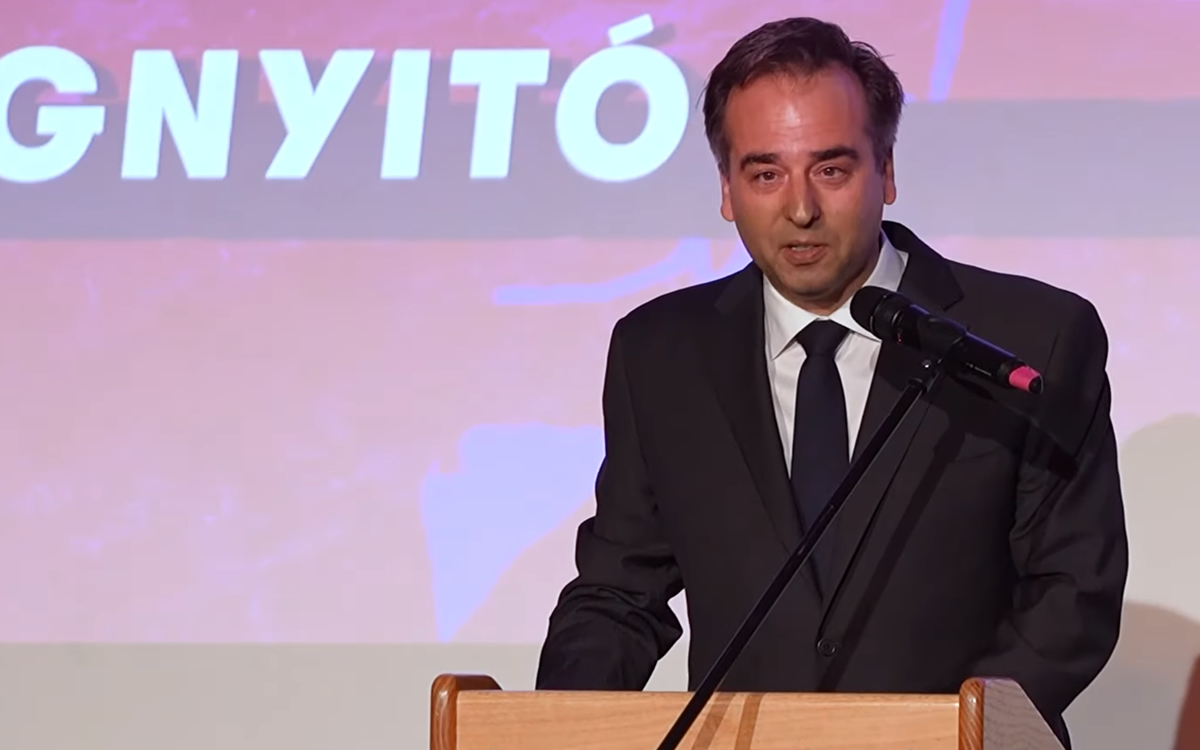
U.S. Ambassador to Hungary David Pressman on June 16 criticized the crackdown on LGBTQ and intersex rights in the European country.
Pressman, who is openly gay, in a speech he gave at a Budapest Pride reception noted he recently visited the Hungarian capital’s House of Terror Museum, which honors those persecuted during Nazi Germany’s occupation of Hungary and the post-World War II Communist governments that ruled the country until 1989. Pressman said one of “its most haunting elements is the depiction of government efforts to turn Hungarians into informants against other Hungarians, neighbors against neighbors, brothers against brothers and parents against their own children — families against themselves — and all in service of oppression … and of empowering the few at the expense of the many.”
“It is impossible not to see echoes of this in your Parliament’s vote earlier this year to encourage neighbors to report to the authorities their gay neighbors raising children,” he added. “Turning neighbor on neighbor conjures a dark past of covert agents and informants, of fear and betrayal, in this country and this region that I do not need to recount. You have a museum for that. While this legislation did not become law, the fact it was ever considered, let alone supported by this government and passed by the legislature is chilling.”
Pressman noted “this proposal is not unique; others became and remain law.”
“Laws prohibiting ‘propaganda of non-traditional sexual relationships’ were adopted by Russia in 2013,” he said. “These Russian laws found a new home here in Hungary eight years later — like a virus spreading — when the government adopted laws to forbid ‘educational programs aimed at the promotion of … homosexuality.’ And this law remains in force today. And — in both Russia and in Hungary — the crackdowns on discourse related to gayness were preceded and accompanied by a closing of space for independent institutions and civil society.”
“History teaches us that when governments start discriminating against one group — whether for who they love or what they believe, their politics or their race, or the color of their skin — others are usually not far behind,” added Pressman. “It teaches us clearly what can happen when we fail to speak out and stand up to these laws and policies as soon as they infect our democracies.”
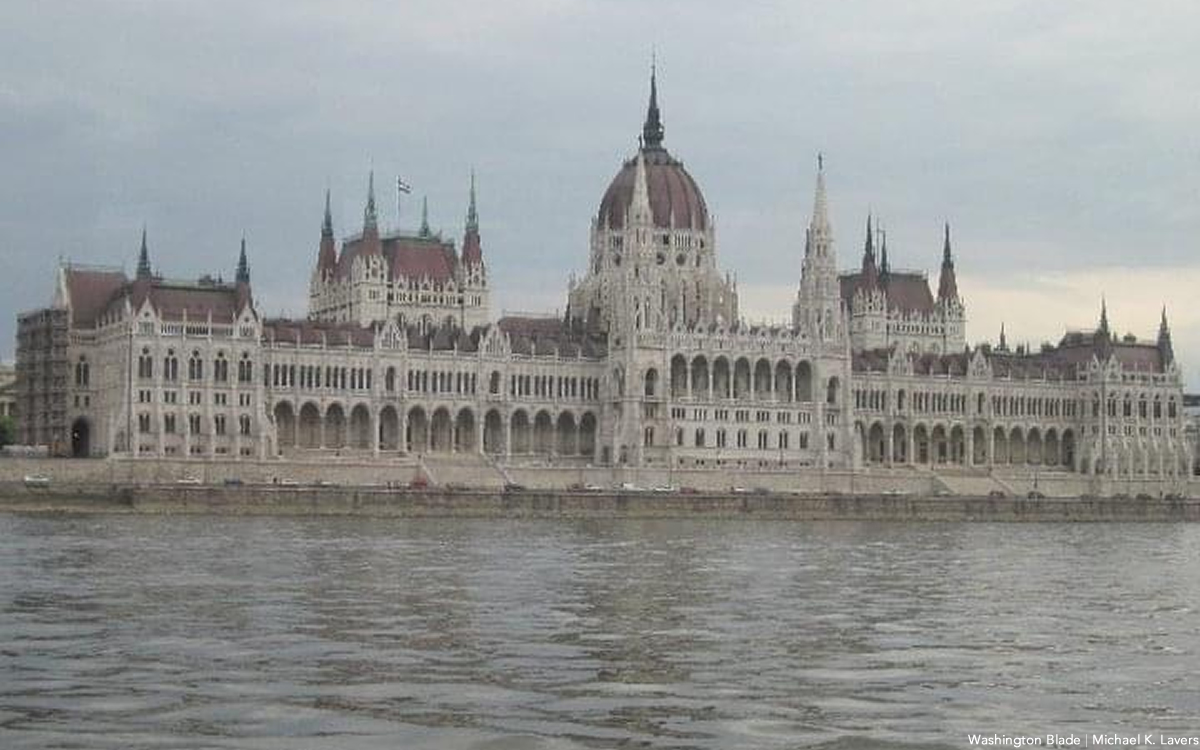
Budapest Pride President Viktoria Radvanyi told the Washington Blade in February after U.S. Agency for International Development Administrator Samantha Power met with her and other activists in the Hungarian capital that it is “impossible to change your gender legally in Hungary” because of a 2020 law that “banned legal gender recognition of transgender and intersex people.”
The anti-LGBTQ propaganda law that Pressman referenced in his speech took effect in 2021.
Hungarian MPs in 2020 effectively banned same-sex couples from adopting children and defined marriage in the country’s constitution as between a man and a woman. Pressman and his partner of 22 years, who was in the room when he gave his speech, have twin sons.
The European Commission last July sued Hungary, which is a member of the European Union, over the country’s propaganda law.
Pressman in his speech noted a high school student in the Hungarian countryside recently asked him what it is like to be an “out gay ambassador” in the country.
“About midway through my response, I paused. Not for lack of words, but because while I was speaking, I heard another voice in the back of my head. And that voice was trying to figure out whether by answering this high school student’s question was I also violating Hungarian law,” said Pressman. “Here I was, the representative of the president of the United States of America in Hungary, and I was questioning what I was allowed to say about myself, whether answering this earnest student’s question was I also violating Hungarian law.”
“This is the devious power of such laws,” he added. “It isn’t merely what a government may do to censor and restrict speech. It is the silence left behind because people are too afraid to speak up in the first place. It is that even earnest questions and truthful answers, really are off limits.”
‘Hungary is not under attack by outside forces’
Prime Minister Viktor Orbán and his government have repeatedly criticized Pressman since President Joe Biden nominated him to become ambassador in May 2022. Pressman, for his part, in his speech repeatedly criticized Orbán over his efforts to curtail LGBTQ and intersex rights in Hungary.
“The truth is that there are Hungarian kids today struggling with who they are and who they love. They yearn to be proud of themselves, proud of their country, and proud to build their future within it,” said Pressman. “And it is also a truth that they are often told — through laws and statements of their political leaders and their media megaphones — that they have something to hide. That they should not be proud of themselves. That their country is not proud of them, and that they have no future in Hungary. That they are, somehow, not actually Hungarian, when they are. That they don’t exist when they do. That they are invented when they are made in God’s image. That their identity is the product of propaganda, when in fact it comes from their own beating Hungarian heart.”
Pressman described Hungarians as “fiercely independent, sophisticated and intelligent people, and rightfully proud of their rich culture and history.”
“No matter how many government-produced posters of ‘Brussels’ bombs may be emblazoned around town at any given moment, the reality is Hungary is not under ‘attack’ by outside forces, or vulnerable to a ‘liberal virus’ or ‘Western decadence,’ or cowering before George Soros, or at the mercy of omnipotent conspiratorial powers,” he added. “No, the reality is something far simpler. The story of Hungary, including its movement for equality, is one being written not by foreigners, but by Hungarians. “
Pressman also predicted government-controlled newspapers would criticize him and incorrectly categorize his speech.
“While the news should report this truthful story factually. I can already read the headlines Minister (Antal) Rogán’s team is dictating for tomorrow’s papers. No doubt I’ll be accused of staging provocations, of importing Western wokeness and foisting obscene values while meddling in Hungary’s domestic affairs,” he said. “What won’t happen is any of the government’s captured and controlled media outlets printing this speech in full. What they’ll cut out — what they always cut out — is the fact that it is Hungarians who believe in these universal human rights, and it is Hungarians leading the fight for them.”
European Union
European Parliament resolution backs ‘full recognition of trans women as women’
Non-binding document outlines UN Commission on the Status of Women priorities

The European Parliament on Feb. 11 adopted a transgender-inclusive resolution ahead of next month’s U.N. Commission on the Status of Women meeting.
The resolution, which details the European Union’s priorities ahead of the meeting, specifically calls for “the full recognition of trans women as women.”
“Their inclusion is essential for the effectiveness of any gender-equality and anti-violence policies; call for recognition of and equal access for trans women to protection and support services,” reads the resolution that Erin in the Morning details.
The resolution, which is non-binding, passed by a 340-141 vote margin. Sixty-eight MPs abstained.
The commission will meet in New York from March 10-21.
A sweeping executive order that President Donald Trump signed shortly after he took office for a second time on Jan. 20, 2025, said the federal government’s “official policy” is “there are only two genders, male and female.” The Trump-Vance administration has withdrawn the U.S. from the U.N. LGBTI Core Group, a group of U.N. member states that have pledged to support LGBTQ and intersex rights, and dozens of other U.N. entities.
European Union
Top EU court: Poland must recognize same-sex marriage from other European countries
Activists celebrate landmark decision
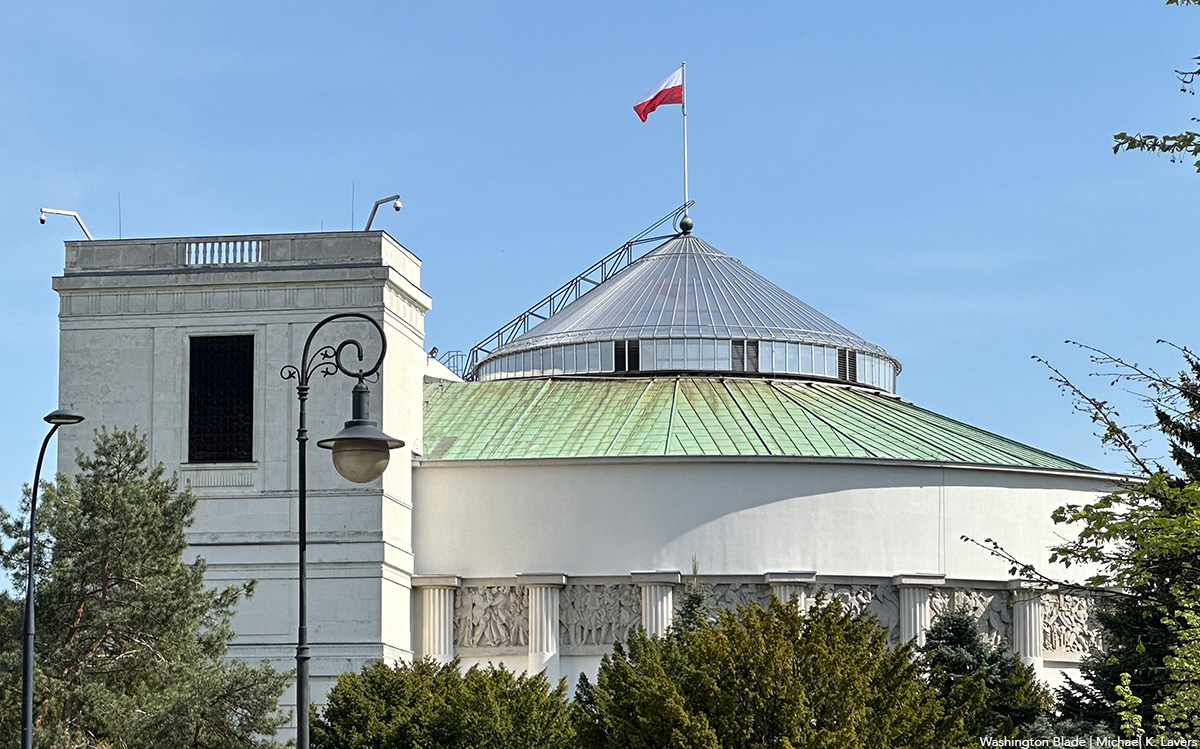
The European Union’s top court on Tuesday ruled member states must recognize same-sex marriages legally performed in other member states.
The EU Court of Justice in Luxembourg ruled in favor of a couple who challenged Poland’s refusal to recognize their German marriage.
ILGA-Europe notes Polish authorities refused “to transcribe into the civil register a certificate of same-sex marriage concluded” in Germany “between a Polish citizen and a Polish-German citizen … on the grounds that Polish law does not allow same-sex marriage.”
The couple who lives in Poland brought their case to Polish courts. The Polish Supreme Administrative Court referred it to the EU Court of Justice.
“Today’s ruling of the Court of Justice of the EU is of key importance not only for the couple involved in the case, but also for the entire LGBT+ community in Poland,” said the Campaign Against Homophobia, a Polish LGBTQ and intersex rights group, in response to the decision. “It clearly states that refusing to transcribe a marriage concluded abroad is incompatible with EU law. Therefore, regardless of the absence of registered partnerships and marriage equality, Poland must ensure the possibility of effective transcription.”
“With this judgment, the CJEU clearly states that the recognition of marriage status is key to enjoying EU citizens’ fundamental right to freedom of movement across the EU,” added ILGA-Europe Advocacy Director Katrin Hugendubel. “The EC now needs to ensure that this judgment is implemented quickly by the Polish state and across the EU.”
Sixteen EU countries — Ireland, Portugal, Spain, France, Luxembourg, Belgium, the Netherlands, Germany, Denmark, Austria, Slovenia, Malta, Greece, Sweden, Finland, and Estonia — have extended full marriage rights to same-sex couples. Poland, Romania, Bulgaria, and Slovakia are the EU countries with no legal recognition of same-sex couples.
European Union
Former Irish prime minister: Europe is leader in global LGBTQ rights movement
Leo Varadkar in 2017 became Ireland’s first gay head of government.
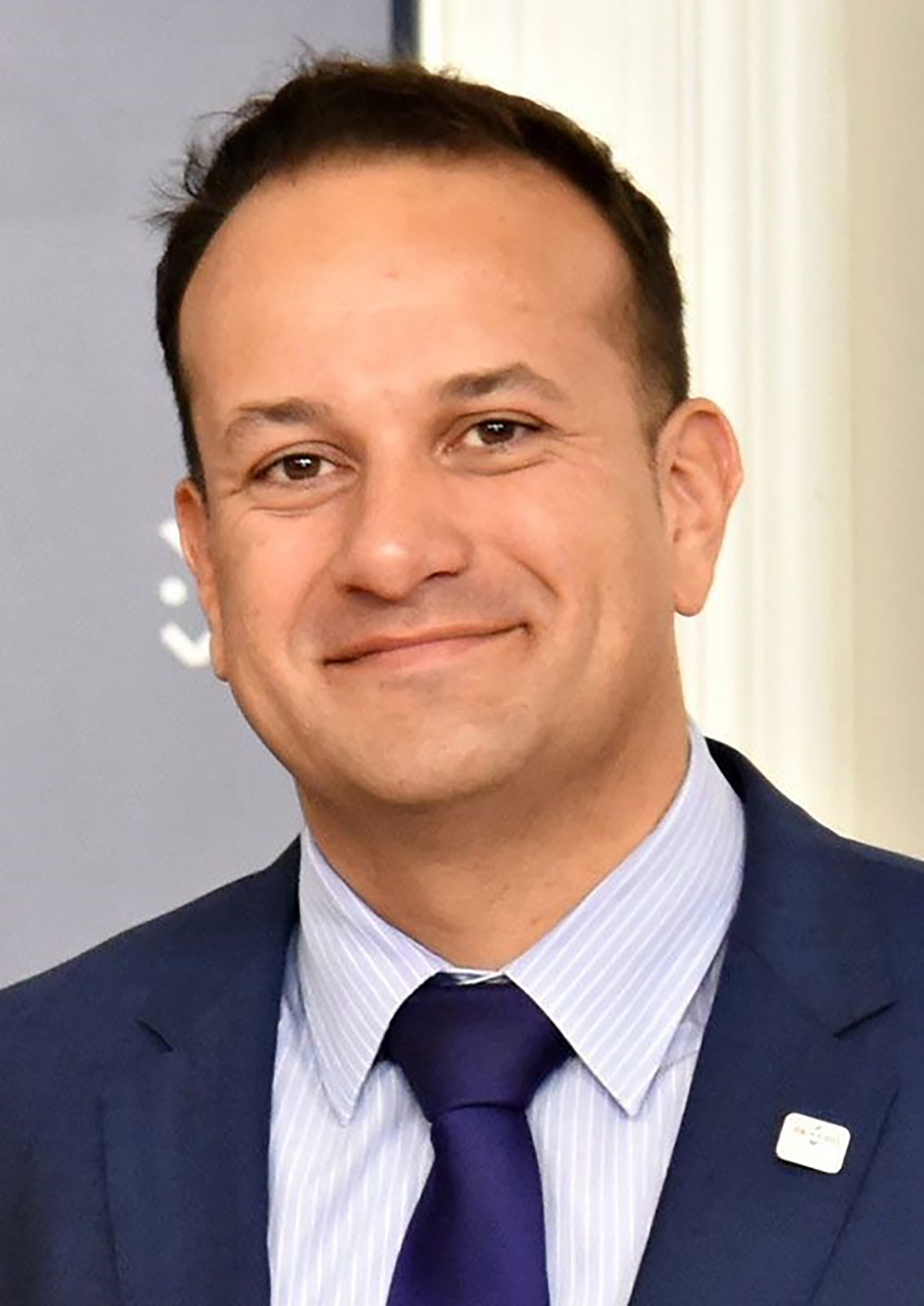
CAMBRIDGE, Mass. — Former Irish Prime Minister Leo Varadkar earlier this month said Europe is now at the forefront of the global LGBTQ and intersex rights movement.
“In many ways, Europe is the light,” he told the Washington Blade on Oct. 20 during an interview that took place near Harvard University. “It’s holding up against anti-LGBTQ policies.”
Varadkar, 46, in 2017 became Ireland’s first gay prime minister.
He stepped down in 2020 after his center-right party, Fine Gael, lost 15 parliament seats in the general election, but he remained in the government. Varadkar, whose father was born in Mumbai, in 2022 once again became prime minister.
Varadkar in 2024 resigned and stepped down as Fine Gael’s leader.
The Harvard Kennedy School’s Carr-Ryan Center for Human Rights on Oct. 16 announced Varadkar’s appointment as a senior fellow for its Global LGBTQI+ Human Rights Program for the 2025-2026 academic year. He — along with former Massachusetts Gov. Deval Patrick and former acting Treasury Secretary David Lebryk — are also Hauser Leaders at the Harvard Kennedy School’s Center for Public Leadership for this year’s fall semester.
Varadkar during his fellowship will focus on LGBTQ and intersex rights within the EU.
He sat down with the Blade on the same day he spoke at Harvard’s Weatherhead Center for International Affairs. Varadkar on Tuesday participated in an event in Brussels that focused on LGBTQ and intersex rights in the EU.
New EU LGBTQ strategy ‘not wonderful, but at least it was done’
The European Commission on Oct. 8 released an LGBTQ and intersex rights strategy that focuses on three specific areas:
- Protecting LGBTIQ+ people (from hate-motivated harassment and violence, from discrimination, from conversion practices)
- Empowering LGBTIQ+ people through (equality bodies, rainbow families, promoting inclusion at workplace)
- Engaging society to advance LGBTIQ+ equality by (calling on all EU countries to adopt national strategies, improving the data collection and analysis, launching an ‘LGBTIQ+ Policy Forum’)
“It’s not wonderful, but at least it was done,” said Varadkar. “You won’t see that done in China, Russia, or even the United States, unfortunately.”
“Europe needs to hold the line, but also we want to focus on places where there is backsliding, like Bulgaria, like Slovakia,” he added, while also referring to the Czech Republic and Hungary.
Varadkar is among those who participated in this year’s Budapest Pride, even though Hungarian Prime Minister Viktor Orbán’s government banned public LGBTQ events.
“It wasn’t just a regular Pride protest, and in Eastern Europe Pride is still a protest, very much so … they’re met by football hooligans, and police who aren’t necessarily there to support there to protect them,” Varadkar told the Blade. “This time, everyone joined in: students, unions, families, even more moderate political forces that might not always want to be associated with the LGBT cause, but it became about freedom of expression and became about free speech, and that’s why there was such a big turnout.”
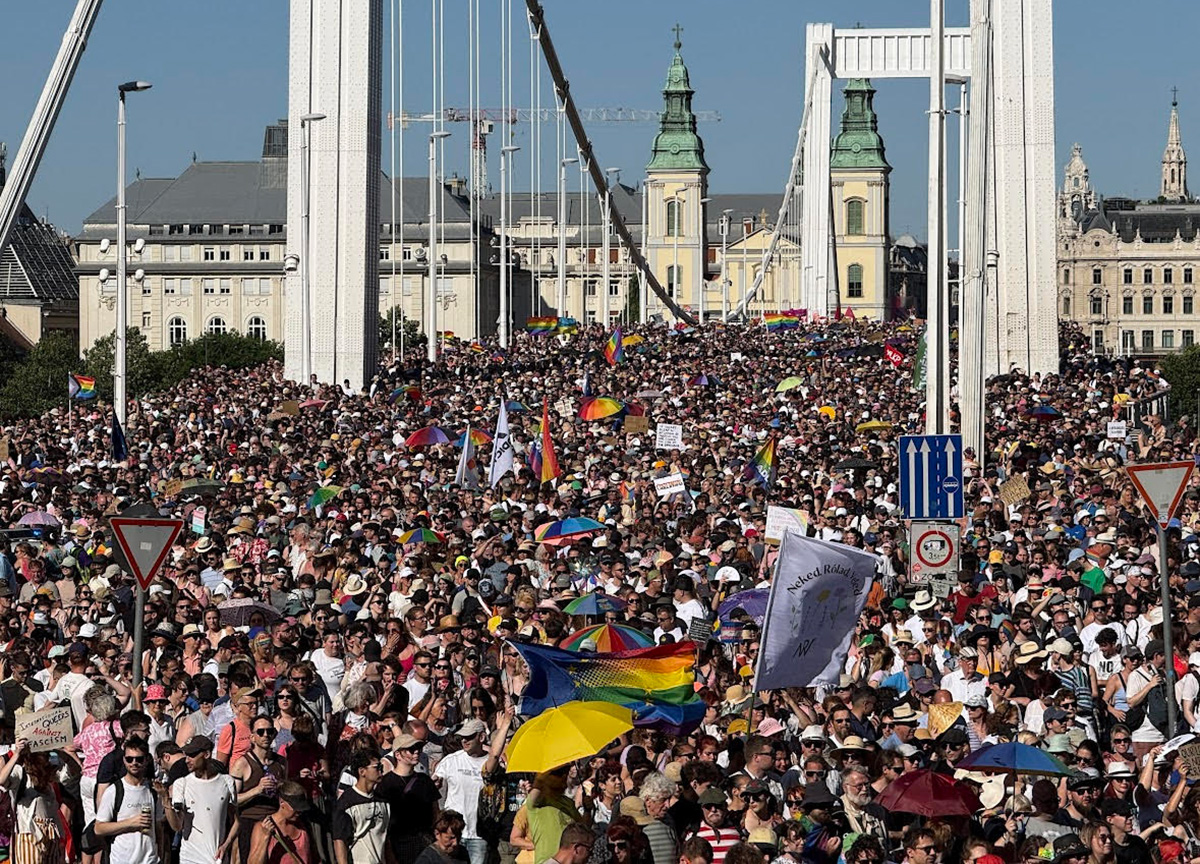
Varadkar since he left office has also traveled to Bulgaria to support the country’s LGBTQ activists. Varadkar also spoke to the Blade about Russia and the Kremlin’s efforts to “influence and destabilize European societies.”
Russia in 2022 launched its war against Ukraine.
“One of the ways they do that is through election interference and misinformation online, and they’ve identified this as an issue that can divide European societies,” said Varadkar, specifically referring to the Russian government’s opposition to LGBTQ rights and its overall human rights record. “[Russian President Vladimir] Putin has very much embraced the idea of traditional values and Russian Orthodox Christianity, and he’s using that as a wedge issue in Central and Eastern Europe.”
“So as ever our fight is part of a bigger fight that’s linked to things like democracy, human rights, academic freedom, press freedom,” added Varadkar. “We’re on the front line in the same battle, in my view.”
He also said the EU needs to be pragmatic in how it responds to Orbán and other anti-LGBTQ leaders.
“[The EU] is in a bit of a dilemma as to how it acts, how it does withdraw funding sometimes from countries if they’re in breach of the standards around the rule of law,” said Varadkar.
The European Commission in 2021 threatened to withhold funding to local and regional governments in Poland that declared themselves “LGBT-free zones.” The European Commission in 2022 sued Hungary over a law that a press release notes “singles out and targets content that ‘promotes or portrays’ what it refers to as ‘divergence from self-identity corresponding to sex at birth, sex change or homosexuality’ for individuals under 18.”
“Some of the more nationalist and populist leaders in Central and Eastern Europe; there’s nothing they want more than a fight with Brussels, these Western European elites … trying to impose their ideology on our country,” Varadkar told the Blade. “So that’s why I think the European Union has to be smart as to how it acts.”
European Commission President Ursula von der Leyen is among those who condemned the Budapest Pride ban. Varadkar told the Blade he “was disappointed there wasn’t more action” from Brussels “in relation to why Budapest Pride was being banned.”
Varadkar praises Sarah McBride
Ireland is among the countries that have issued travel advisories for transgender and nonbinary people who are planning to visit the U.S. since the Trump-Vance administration took office.
President Donald Trump shortly after his inauguration issued a sweeping executive order — Defending Women from Gender Ideology Extremism and Restoring Biological Truth to the Federal Government — that, among other things, bans the State Department from issuing passports with “X” gender markers. Trump in his inaugural speech also said the federal government will only recognize two genders: male and female.
Trump in February issued another executive order that bans trans women and girls from female sports teams. U.S. Citizenship and Immigration Services in August announced it will ensure “male aliens seeking immigration benefits aren’t coming to the U.S. to participate in women’s sports.”
The promotion of LGBTQ and intersex rights abroad was a cornerstone of the Biden-Harris administration’s overall foreign policy.
Secretary of State Marco Rubio on Jan. 24 directed State Department personnel to stop nearly all U.S. foreign aid spending for 90 days in response to an executive order that Trump signed after his inauguration. Rubio later issued a waiver that allowed PEPFAR and other “life-saving humanitarian assistance” programs to continue operating after bowing to pressure, but the Blade has reported PEPFAR-funded programs in Kenya and other African countries have been forced to suspend services and even shut down because of gaps in U.S. funding.
Rubio in March announced 83 percent of U.S. Agency for International Development contacts had been cancelled, and the State Department would administer the remaining programs. USAID officially shut down on July 1.
The global LGBTQ and intersex rights movement has lost more than an estimated $50 million in funding since the Trump-Vance administration took office.
“It has an impact, particularly on organizations in the Global South and in Central and Eastern Europe,” said Varadkar.

Varadkar told the Blade he is working with the Global Development Project and other philanthropic organizations to “fill some of the gap” in funding.
He said the current situation “demonstrates why we should never be too dependent on any government or corporations.” Varadkar also spoke more broadly about the Trump-Vance administration and its policies.
“I’m a guest in this country. I’m not here to tell you what to do. The American people decide who the president is. I don’t, but I am genuinely disappointed to see the backsliding on human rights and academic freedom and free speech here in America,” said Varadkar.
“What do I associate America with? I associate it with being one of the homes of democracy and helping to spread it around the world. I associate it with free speech, sometimes even saying any crazy thing you want. And I associate it with as being the birthplace of the LGBT liberation movement. I think of Stonewall. I think of the Castro,” he added. “It all started here, long before anyone in Ireland could ever imagine homosexual acts being decriminalized, let alone a gay person being the head of government.”
“To me this is where it all started,” said Varadkar. “It’s particularly worrying that things appear to be going in the wrong direction here, and that has impacts in the rest of the world too, that Americans might be very aware of.”
Varadkar also said he admires U.S. Rep. Sarah McBride (D-Del.), who in 2024 became the first openly trans person elected to Congress.
“She’s there for everyone in Delaware, and yes, she is trans too,” Varadkar told the Blade. “She’s willing to be a leader, but I think as LGBT leaders, we should make sure that our causes are part of the wider welfare and society and not separate.”
-

 Baltimore4 days ago
Baltimore4 days ago‘Heated Rivalry’ fandom exposes LGBTQ divide in Baltimore
-

 Real Estate4 days ago
Real Estate4 days agoHome is where the heart is
-

 District of Columbia4 days ago
District of Columbia4 days agoDeon Jones speaks about D.C. Department of Corrections bias lawsuit settlement
-

 European Union4 days ago
European Union4 days agoEuropean Parliament resolution backs ‘full recognition of trans women as women’




















